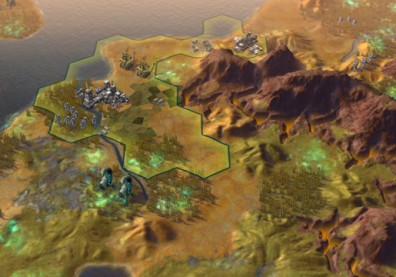One of the new additions to the Civ formula in Civilization: Beyond Earth is the Orbital Layer and the orbital units that inhabit it. These orbital units can provide great bonuses, but they don't last very long. Make sure you know what you're getting into before diving into this new mechanic.
More Civilization: Beyond Earth Tips: Know Your Tile Improvements And Where To Put Them
Introduction
Here's how the system works. Orbital units can be constructed just like any other unit. When they're completed, you can deploy them into the orbital layer, as long as you launch it into an area where you have Orbital Coverage. Each city provides Orbital Coverage for a four-tile radius around its location, but this radius can be increased with various buildings, Wonders, quests and one tile improvement. Once the unit is in orbit, it'll provide its bonuses to the tiles in its area of effect (which varies between orbital units) for a set number of turns (usually 60, but sometimes 30 or 10 depending, again, on the unit).
Once the unit runs out of turns, it crashes down to the ground, where it can be worked by explorer units to provide a science or production bonus. Orbital units can also be shot from the sky by enemy cities or missile rovers, or they can be manually deorbited by the player that sent it up.
More Civilization: Beyond Earth Tips: Dealing With Aliens In The Early Game
Bonuses orbital units can provide
There are a couple of different types of orbital units. Early orbital units can be used to clear out harmful miasma, which is helpful with exploration in the early game. There's also a unit that puts the misama back onto tiles if you want to disrupt enemy trade routes or if you are playing a Harmony game and want some extra home-field advantages.
Some orbital units are directly useful militarily. These orbital strike units mostly show up in the late game, but they provide devastating damage for anyone foolish enough to walk beneath them. There's even a unique orbital strike unit for Harmony players, the Rocktopus. Since your Orbital Coverage is centered on your own cities, these orbital strike units might be better suited for defense than offense, but these tools can be utilized however you see fit.
Many orbital units focusing on increasing the yields of your cities' tiles. We've already covered the kinds of orbital units that can actually generate workable resources on otherwise empty tiles, but there are other units whose job is just to make your tiles a little more profitable. The Solar Collector will make each of the tiles in its range produce one more unit of energy per turn, as well as increase the amount of energy produced by a city in its range. The Holomatrix will add a +2 culture yield to all tiles in its radius. And there are other units that accomplish similar goals with different types of yields.
Tips and tricks
Almost all orbital units require petroleum, and many require titanium as well. If you're planning on heavily utilizing orbital units in your next game, consider picking up the Tectonic Scanner perk in the seeded start. It reveals sources of titanium, petroleum and geothermal right from the get-go, so you can start planning early on where the best city locations for you will be. If you are planning on going hard in the Orbital Layer, also consider picking the Soviet Federation as your sponsor. Their orbital units stay up 20 percent longer, and you get a free tech when you launch your first satellite.
Orbital units are a good way to beef up the yields of some of your more lackluster city locations. Start producing orbital units in your more productive cities so you can then launch them over your weaker ones. It's a good way to spread the wealth among your own cities while keeping your trade units free for lucrative trading with stations and other players.
Finally, if you're playing against an opponent who is dominating with the Espionage System (so, if you're playing against the ARC), head toward the Dark Networks technology on the edge of the Tech Web. It contains the All-Seer orbital unit, which forces spies and Intrigue out of your city and protects it for 30 turns. As a bonus, you'll unlock a powerful orbital strike unit along the way.
Sid Meier's Civilization: Beyond Earth is now available for PC. Mac and Linux versions are coming later this year.










